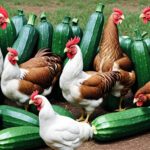When it comes to raising chickens, the quest for providing optimal nutrition is unending. As backyard poultry enthusiasts strive to enhance their flocks’ well-being, one question often sprouts up: Can chickens eat kale? This leafy green, lauded for its nutrient density in human diets, is under the spotlight for its potential benefits for our feathered friends. Join us as we delve into the world of chickens and kale, revealing the unheard-of benefits that could revitalize your chickens’ health and your approach to their dietary needs.
The Nutritional Powerhouse: Kale in Your Chickens’ Diet
The Kale Controversy: Is It Safe for Chickens?
Kale, a cruciferous vegetable that has been at the forefront of the health food movement, is packed with a multitude of vitamins and minerals. But can this superfood live up to its reputation in the realm of poultry nutrition? The answer is a resounding yes. When incorporated rightly, kale can be a boon to your chickens’ diet.
Decode the Nutrient Complex of Kale
To truly understand the impact of kale on your flock, it’s vital to break down its nutrient composition:
- Vitamins A, C, and K: These are the stalwarts of kale’s vitamin brigade, promoting vision, immune health, and blood clotting.
- Calcium and Phosphorus: Crucial for bone health, these minerals also contribute to eggshell quality.
- Antioxidants: The presence of antioxidants like quercetin and kaempferol underline kale’s potential in combating oxidative stress in chickens.
Portion Control: How Much Kale Is Too Much?
While kale can be a healthy addition, it’s important to practice moderation. Excessive amounts could lead to health issues, such as an imbalance in nutrients or potential thyroid problems due to goitrogens found in cruciferous vegetables.
Strike the Right Balance
- Treat Frequency: Offer kale as a treat, not exceeding 10% of their overall diet.
- Diversity Matters: Always pair kale with a variety of other foods to ensure a well-rounded diet for your chickens.
Ruffled Feathers and Digestive Concerns: Preparing Kale for Your Chickens
The Art of Prepping Kale
Before you start sprinkling kale into the feeding area, it’s crucial to prepare it properly:
Cleaning and Chopping: Ensuring Safety and Digestibility
- Wash Thoroughly: Always rinse kale under cool, running water to remove potential pesticides.
- Chop It Up: Break down kale into smaller pieces to prevent choking and aid in digestion.
Cooking vs. Raw: Best Practices for Serving Kale to Chickens
While humans may argue over the virtues of raw versus cooked kale, when it comes to chickens, both can be appropriate. Slightly cooking kale can reduce the effect of goitrogens, but raw kale retains its maximum nutrient profile.
Methods to Serve
- Raw: Offer washed and chopped kale directly to your chickens.
- Steamed: Lightly steam kale to soften it and reduce goitrogens.
The Garden of Delights: Growing Kale for Your Flock
The Perks of Homegrown Kale
Growing your own kale can dramatically increase the health benefits for your chickens, due to the freshness and reduction in chemicals.
Tips for Cultivating Chicken-Friendly Kale
- Choose the Right Variety: Opt for hardy kale varieties that can withstand pecking.
- Organic Farming Methods: Use natural pesticides to ensure that your chickens consume only the healthiest leaves.
Integrating Kale into a Chicken-Friendly Garden
Beyond just growing kale, consider creating a chicken garden where your flock can forage.
Creating a Foraging Paradise
- Diverse Plant Selection: Cultivate a garden with various herbs and vegetables alongside kale for a nutrient-rich environment.
The Flip Side: Potential Risks of Feeding Kale to Chickens
While the benefits are many, we must address the potential risks to keep our polish chicken breedss safe.
Goitrogens and Thyroid Health
Excessive consumption of kale can interfere with thyroid function due to goitrogens. Monitor how much kale your easy buffalo chicken dip recipes eat and observe their health closely.
Balancing with Iodine-Rich Foods
- Supplementation: Incorporate iodine into the diet to counteract goitrogenic effects.
- Observation Is Key: Watch for signs of thyroid issues, like lethargy or weight gain.
Real Chicken Stories: Testimonials on the Impact of Kale
Positive Flock Dynamics
Owners who have introduced kale into their chickens’ diet often report improvements in feather quality and egg production.
Tales of Transformation
- Egg-cellent Results: Many report stronger eggshells and higher laying rates.
- Vibrant Feathers: Chickens consuming kale may exhibit glossier and fuller feathers.
Versatility in the Coop: Creative Ways to Feed Kale to Chickens
Treat Dispensers and Kale Toys
Engage your chickens’ natural behaviors by providing kale in interactive ways.
DIY Kale Hanging Feeder
- Use a Cabbage Ball Holder: Insert kale leaves into a ball holder to encourage playful pecking.
- Create a Kale Garland: String up kale leaves for chickens to jump and peck at.
Mixing Kale with Other Chicken Favorites
Blend kale with grains or layer pellets to make it more enticing for your chickens.
Kale-Infused Feed
- Grain Mixture: Mix chopped kale with whole grains like oats or corn.
- Layer Pellet Salad: Toss kale with layer pellets for an enriched feed option.
The Organic Shift: Kale as a Step Towards a More Natural Diet for Chickens
Embracing an Organic Diet for Your Flock
Many are turning to organic feeds and supplements, including kale, to promote health and longevity in chickens.
The Philosophy Behind Organic Poultry Rearing
- Reduced Chemical Exposure: Limiting commercial feed and growing your own kale reduces the ingestion of harmful substances.
- Sustainability and Ethical Practices: Organic farming supports a more sustainable and ethical approach to poultry care.
Conclusion: A Kaleidoscope of Benefits Awaits
The journey through the benefits and proper use of kale in a chicken’s diet reveals a spectrum of advantages that, when managed correctly, can contribute significantly to their overall health. By understanding the nutritional value and serving practices of kale, you equip yourself with the knowledge to make informed decisions that could elevate the status quo of backyard chicken diets. From the careful preparation of this leafy green to integrating it into a diverse, organic feeding strategy, your commitment to exploring the wonders of kale could lead to a flock that thrives beyond imagination.
Backyard chicken enthusiasts are continually seeking the best for their flock, and it becomes evident that kale could be a worthy avian superfood. With all the surprising benefits and captivating real-life transformations, we encourage you to responsibly introduce kale into your chickens’ diet and witness the vibrant health it can encourage. As they say in the world of poultry — a peck of kale a day could just lead to eggs all the way!







